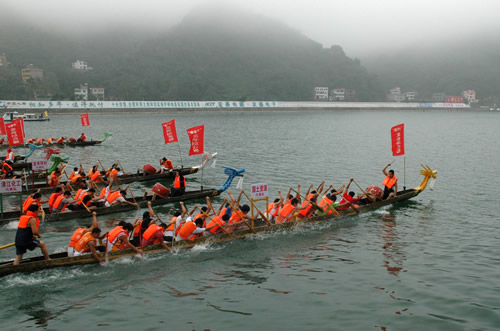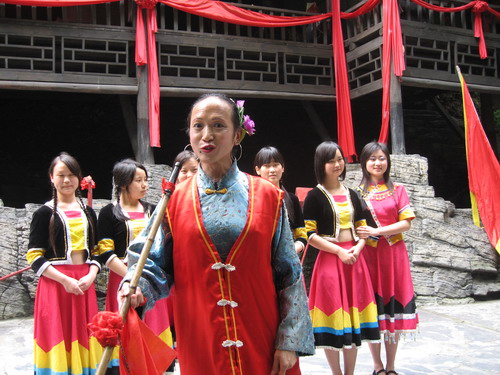| About Hubei | Culture & Arts | ||
| Attractions | Routes | ||
| Dining | Shopping | ||
| Hotels | Transportation | ||
| Entertainment | Travel agencies |
Jingshan to attract Wuhan tourists
Storytelling queen
For the love of Wuhan
Dangyang to promote tourism


Yichang folk customs and cultures
Updated: 2011-12-29
The Tujia ethnic group lives in compact communities that are mountainous and rich in products. They attract Chinese and foreign tourists with magnificent natural sceneries and folk custom. Tujia ethnic group calls themselves Bi Zi Ka, meaning, "local born and bred." About 2,000 years ago, they settled down in the western parts of today's Hunan and Hubei provinces. For this reason, they are referred to as "barbarians of Wuling" or "barbarians of Wuxi".
 |
| Yichang folk customs and cultures |
The custom of dragon-boat racing emerged as early as Western Zhou Dynasty. The bronze wares of the Spring and Autumn period were carved with images of Yue people participating in the activity. It shows the dragon-boat race came before the era of Qu Yuan. When it came to the Warring States Period, Qu Yuan, a patriotic senior official of Chu Kingdom, lost all hope and jumped into the Miluo River to die. Hearing of the sad news, people of Chu Kingdom "felt sorrow and paddled boats to save him" (see Continuation of All Writings of Qi Dynasty, written by Wu Jun of the Northern and Southern Dynasties). Since then, the dragon-boat race evolved into a folk custom in memory of Qu Yuan. In Tang Dynasty, the royal court gave orders to commemorate Qu Yuan. The dragon-boat race became popular among the people and has remained prosperous for over 1,000 years.
 |
| Yichang folk custom and cultures |
On May 5 in the lunar calendar, local people have the custom of wrapping Chinese rice-pudding, hanging incense bags, calamus, felon herbs, burning moax sticks, and offering sacrifices to ghosts and gods at the riverside. The public activity is to hold the annual dragon boat race. This traditional festival is known as Duanwu Festival, Dragon Boat Festival, or Duanyang Festival. Duan means "beginning of the month." Since Tang Dynasty, May and the fifth of a month are referred to as Wu, this is the where the name Duan Wu derives from. Since it contains two Wu, this day is also described as Double Wu. Ancient Chinese call Wu, the period of the day from 11 a.m. to 1p.m., so the day is known as Duanyang as well.
The Dragon Boat Festival (the 5th day of the 5th lunar month) has two origins. Mr Wen Yiduo said in Mythology and Poetry that the Dragon Boat Festival is rooted in the Dragon Son Festival of the Wuyue ethnic group of old times. Chinese forefathers took a dragon as the totem. The Dragon Son Festival was a grand ceremony to offer sacrifices to the dragon ancestors. If this version is true, the Dragon Boat Festival could be dated back to the distant past. Another origin, which is the more popular, advances that the Dragon Boat Festival takes place to commemorate the death of Qu Yuan, who cared for the fate of his nation. People were shocked of his death. In memory of him, people rowed dragon boats in the river on May 5 in search of his body. They threw rice wrapped in bamboo leaves into the river to feed aquatic life so that they do not devour the body of Qu Yuan. This gives rise to today's folk custom of dragon boat racing and of eating rice-pudding. Under this version, the Dragon-boat Festival has a history of over 2,000 years.
According to historical records, Dragon-boat Festival was very popular in Tang Dynasty. The royal court gave Qu Yuan the title Duke Loyalty and set May 5 as the Dragon Boat Festival. It instructed people to commemorate Qu Yuan throughout the country. In this way, the Dragon Boat Festival has become a formal commemoration day. All folk customs of the Dragon Boat Festival enjoy a long history.